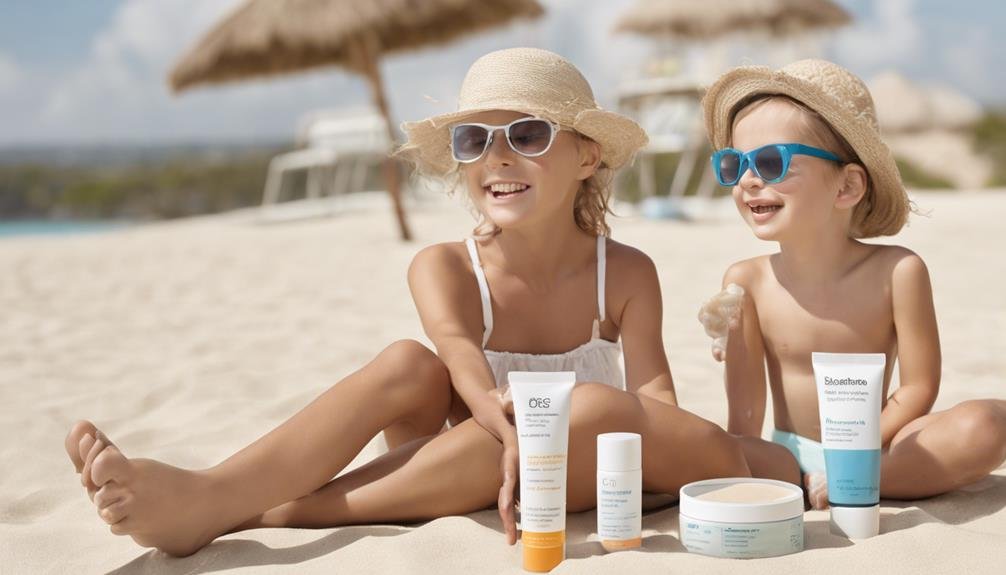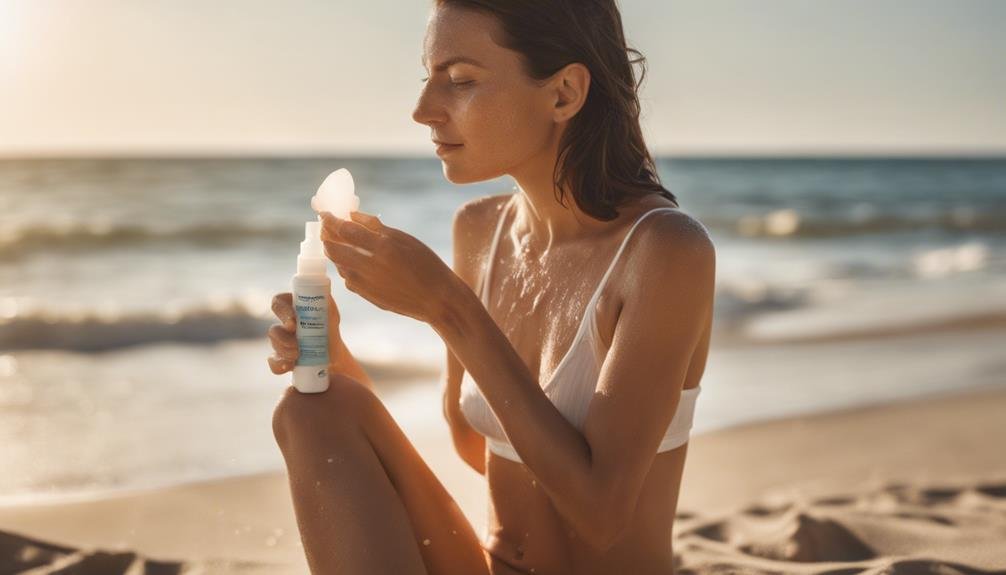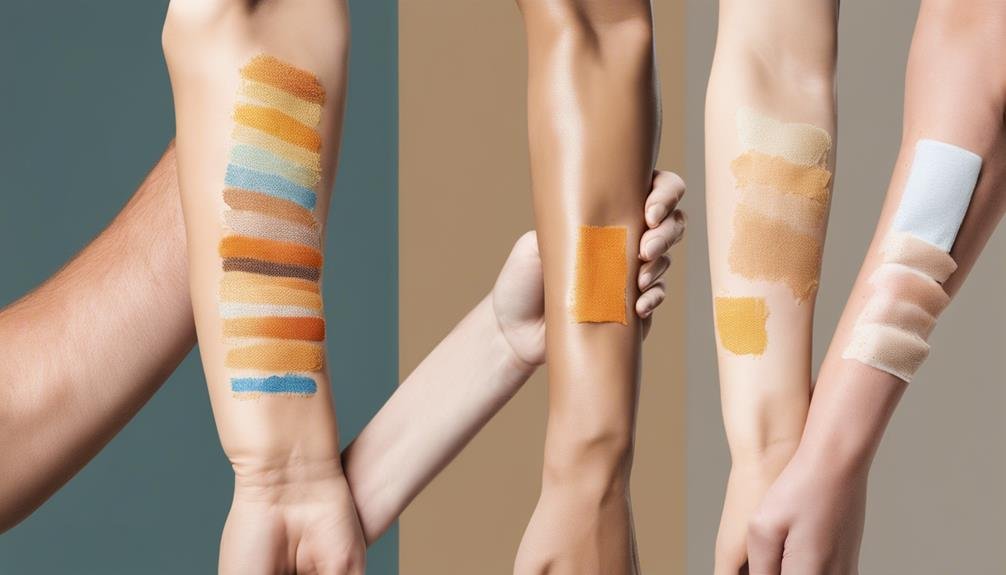Imagine your skin as delicate as a butterfly's wing, requiring gentle care and protection from the harsh rays of the sun. With the plethora of sunscreen options available, navigating through them all can be overwhelming. However, by understanding the nuances of sensitive skin and choosing the right sunscreen tailored to your needs, you can ensure both effective sun protection and skin comfort. But how do you find the perfect sunscreen match for your sensitive skin? Let's explore the key factors to consider in selecting the ideal sunscreen that will keep your skin safe and happy under the sun.
Key Takeaways
- Opt for mineral sunscreens with zinc oxide or titanium dioxide for gentle protection.
- Choose fragrance-free and hypoallergenic formulas to reduce skin irritation.
- Patch test new sunscreen products on a small area before full application.
- Avoid common irritants like fragrance, oxybenzone, and alcohol in sunscreen ingredients.
- Reapply sunscreen every two hours and select broad-spectrum options for optimal sun protection.
Understanding Sensitive Skin
Understanding sensitive skin is crucial when it comes to selecting the right sunscreen. If you have sensitive skin, you may experience reactions like redness, itching, or stinging when using certain products. It's essential to choose sunscreens specifically formulated for sensitive skin to minimize these reactions. Look for labels that mention "gentle," "hypoallergenic," or "fragrance-free" as these formulations are less likely to cause irritation.
Sensitive skin can be triggered by various factors such as harsh chemicals, fragrances, or certain ingredients commonly found in sunscreens. Opt for mineral-based sunscreens containing ingredients like zinc oxide or titanium dioxide, as these are less likely to cause irritation compared to chemical sunscreens.
Additionally, consider testing a small amount of the sunscreen on a small patch of skin before applying it all over to check for any adverse reactions.
SPF and Broad-Spectrum Protection
When selecting a sunscreen for your sensitive skin, it's crucial to consider both the SPF level and the broad-spectrum protection it offers.
- Protection from Harmful Rays: Ensuring your sunscreen has a high SPF level shields your delicate skin from harmful UVA and UVB rays, reducing the risk of sunburn and skin damage.
- Prevention of Premature Aging: Broad-spectrum protection not only prevents sunburn but also helps in reducing the signs of premature aging caused by sun exposure, keeping your skin looking youthful and healthy.
- Minimization of Sensitivity Reactions: Opting for a sunscreen with broad-spectrum protection can help minimize the chances of sensitivity reactions, providing a gentle shield against the sun's harsh effects on your skin.
- Long-lasting Defense: Choosing a sunscreen with a high SPF and broad-spectrum protection ensures long-lasting defense against the sun's rays, enabling you to enjoy outdoor activities without worrying about skin irritation or damage.
Physical vs. Chemical Sunscreens
To make an informed choice for your sensitive skin, it's important to differentiate between physical and chemical sunscreens.
Physical sunscreens, also known as mineral sunscreens, contain active mineral ingredients like zinc oxide or titanium dioxide. These minerals sit on the surface of your skin and work by reflecting and scattering UV rays away from your skin. They're gentle on sensitive skin and provide broad-spectrum protection against both UVA and UVB rays.
On the other hand, chemical sunscreens contain organic (carbon-based) compounds that absorb UV radiation and convert it into heat, which is then released from the skin. While effective, some chemical filters like oxybenzone and octinoxate can be irritating to sensitive skin. They work by penetrating the skin, which can lead to potential allergic reactions.
If you have sensitive skin, you may want to opt for a physical sunscreen to minimize the risk of irritation and adverse reactions.
Fragrance-Free Formulas
For individuals with sensitive skin, opting for fragrance-free formulas when selecting a sunscreen can be a wise choice. Fragrances in skincare products can sometimes irritate sensitive skin, causing redness, itching, or even allergic reactions. Here are some reasons why choosing fragrance-free formulas is beneficial:
- Gentle Formulation: Fragrance-free sunscreens are often formulated with gentle ingredients that are less likely to trigger skin irritation.
- Reduced Risk of Allergic Reactions: By eliminating fragrances, the risk of experiencing allergic reactions on sensitive skin is significantly reduced.
- Soothing for Irritated Skin: Fragrance-free formulas are ideal for individuals with skin conditions like eczema or rosacea, as they're less likely to aggravate already sensitive or irritated skin.
- Versatile for All Ages: Fragrance-free sunscreens are suitable for all ages, making them a versatile option for families with varying skincare needs.
When considering a sunscreen for sensitive skin, opt for fragrance-free formulas to provide effective sun protection without the risk of skin irritation or allergic reactions.
Hypoallergenic Options
Considering hypoallergenic options when selecting a sunscreen is crucial for individuals with sensitive skin. Hypoallergenic sunscreens are formulated to minimize the risk of allergic reactions, making them ideal for those with easily irritated skin. These sunscreens are free from common allergens and harsh chemicals, reducing the chances of adverse skin reactions.
| Hypoallergenic Sunscreens | |
|---|---|
| Product | Key Features |
| Aveeno Positively Mineral Sunscreen | Contains naturally-sourced zinc oxide for gentle protection. |
| La Roche-Posay Anthelios Melt-In Milk Sunscreen | Ultra-light texture suitable for sensitive skin. |
| CeraVe Hydrating Mineral Sunscreen | Provides broad-spectrum protection while hydrating the skin. |
When choosing a hypoallergenic sunscreen, look for products labeled as such and check the ingredient list for potential irritants. Conduct a patch test before full application to ensure compatibility with your skin. Opting for hypoallergenic options can help safeguard your skin against sensitivities and reactions, providing the sun protection you need without compromising skin health.
Non-Comedogenic Sunscreens
When selecting sunscreen for sensitive skin, it's essential to consider non-comedogenic options. These sunscreens are formulated to not clog pores, making them ideal for those with sensitive or acne-prone skin. Here are some reasons why non-comedogenic sunscreens are a great choice for you:
- Gentle Formulation: Non-comedogenic sunscreens are designed to be gentle on the skin, reducing the risk of irritation or breakouts.
- Lightweight Texture: These sunscreens are often lightweight and non-greasy, providing comfortable wear throughout the day.
- Effective Protection: Despite being gentle, non-comedogenic sunscreens offer effective broad-spectrum protection against both UVA and UVB rays.
- Breathable Formula: The non-comedogenic nature of these sunscreens allows your skin to breathe, preventing that heavy or suffocating feeling often associated with sunscreen.
Choosing a non-comedogenic sunscreen can help you protect your sensitive skin without worrying about potential adverse reactions.
Water-Resistant Varieties
Seeking sunscreens that can withstand water exposure? Water-resistant sunscreens are a great option for those who enjoy swimming, sweating, or participating in water activities while staying protected from the sun's harmful rays. These sunscreens are designed to maintain their effectiveness even after exposure to water for a certain period, providing you with reliable sun protection during your outdoor adventures.
Here is a breakdown of factors to consider when choosing water-resistant sunscreens:
| Feature | Description | Benefits |
|---|---|---|
| SPF Level | Higher SPF offers more protection | Guards against sunburn and skin damage |
| Water Resistance | Indicates how long the sunscreen remains effective in water | Extends sun protection during water activities |
| Broad Spectrum | Protects against UVA and UVB rays | Prevents premature aging and skin cancer |
| Skin Type | Consider if the formula is suitable for sensitive skin | Minimizes irritation and allergic reactions |
| Reapplication | Check if it requires frequent reapplication | Ensures continuous sun protection throughout the day |
When selecting a water-resistant sunscreen, look for a high SPF level, broad-spectrum coverage, and a formula that suits your skin type to ensure optimal protection during water-related activities.
Dermatologist-Recommended Brands
For individuals with sensitive skin, navigating the vast array of sunscreen options can be overwhelming. When looking for sunscreen brands recommended by dermatologists, consider these trusted options:
- EltaMD: Known for its gentle formulations suitable for sensitive skin, EltaMD offers a range of sunscreens that are non-comedogenic and fragrance-free.
- La Roche-Posay: This brand is often recommended by dermatologists for its broad-spectrum protection and inclusion of soothing ingredients like thermal spring water.
- CeraVe: With a focus on skincare that's gentle yet effective, CeraVe's sunscreens are often recommended for sensitive skin due to their ceramide-rich formulas.
- Aveeno: Dermatologists frequently recommend Aveeno sunscreens for their use of naturally sourced ingredients like oat extract, which can be soothing for sensitive skin.
When choosing a sunscreen for sensitive skin, opting for a dermatologist-recommended brand can provide reassurance that the product has been formulated with care for delicate skin types.
Mineral Sunscreens for Sensitivity
Consider mineral sunscreens when you have sensitive skin, as they often provide gentle protection without irritating ingredients commonly found in chemical sunscreens. Mineral sunscreens use zinc oxide or titanium dioxide as active ingredients, forming a physical barrier on the skin that reflects and scatters harmful UV rays. These sunscreens are less likely to cause irritation or allergic reactions, making them suitable for sensitive skin types. They work immediately upon application, making them a great choice for those with reactive skin.
When selecting a mineral sunscreen, look for broad-spectrum protection to shield against both UVA and UVB rays. Opt for a formula that's fragrance-free and hypoallergenic to minimize the risk of irritation. Mineral sunscreens are also less likely to clog pores, making them a good option for those prone to breakouts. Remember to reapply every two hours, especially if you're swimming or sweating.
Sensitivity to Common Ingredients
When it comes to sensitivity to common ingredients in sunscreens, being aware of potential irritants is crucial for maintaining healthy skin. Some ingredients commonly found in sunscreens can trigger reactions in sensitive skin, causing discomfort and redness. Here are a few key irritants to watch out for:
- Fragrance: Fragrances added to sunscreens can be irritating to sensitive skin and may lead to allergic reactions.
- Chemical Filters: Some chemical filters like oxybenzone and octinoxate can be harsh on sensitive skin, causing redness and irritation.
- Alcohol: Alcohol-based sunscreens can be drying and irritating for sensitive skin, leading to inflammation and discomfort.
- Parabens: Parabens are preservatives used in sunscreens that can cause allergic reactions and irritation in sensitive individuals.
Patch Testing New Products
Patch testing new products before full application is a crucial step in safeguarding sensitive skin from potential irritants and adverse reactions. To conduct a patch test, apply a small amount of the sunscreen on a small area of skin, like the inner forearm. Leave it on for 24 hours and observe for any signs of redness, itching, or irritation. If no reaction occurs, you can proceed with applying the sunscreen to a larger area. Remember, even natural or hypoallergenic products can cause reactions, so testing is essential.
When patch testing, ensure the area is clean and dry, and avoid applying other products nearby to prevent interference with the results. If any discomfort or reaction arises during the test, immediately rinse the area with water and discontinue use. It's recommended to test new sunscreens, especially those with different formulations or ingredients, before using them extensively.
Sunscreen Application Tips
For effective protection against harmful UV rays, proper application of sunscreen is essential. To ensure you're getting the most out of your sunscreen, follow these application tips:
- Apply Generously: Don't skimp on sunscreen; use a generous amount to cover all exposed areas adequately.
- Reapply Regularly: Remember to reapply every two hours, or more frequently if you're swimming or sweating.
- Cover Often Missed Areas: Pay special attention to often neglected areas like ears, back of the neck, and tops of feet.
- Wait Before Sun Exposure: Allow your sunscreen to absorb fully before heading out into the sun to ensure maximum effectiveness.
Frequently Asked Questions
Can Sunscreen Cause Skin Irritation on Sensitive Areas Like the Eyelids?
Yes, sunscreen can cause skin irritation on sensitive areas like the eyelids. Protect these areas by choosing gentle formulas with physical blockers like zinc oxide or titanium dioxide. Opt for fragrance-free and hypoallergenic options to minimize sensitivity.
Are There Specific Sunscreens Suitable for Sensitive Skin on the Scalp?
For sensitive skin on your scalp, look for sunscreens labeled as gentle or formulated for sensitive skin. Opt for mineral-based sunscreens with zinc oxide or titanium dioxide. Apply a small amount first to test for any irritation.
Can Sunscreen Ingredients Trigger Reactions in Individuals With Eczema?
Yes, sunscreen ingredients can trigger reactions in individuals with eczema. It's essential to choose sunscreens labeled "hypoallergenic" or "designed for sensitive skin." Look for formulas with physical blockers like zinc oxide or titanium dioxide for better compatibility.
Is It Safe to Use Sunscreen on Babies With Sensitive Skin?
Yes, it's safe to use sunscreen on babies with sensitive skin. Opt for mineral-based sunscreens with gentle ingredients like zinc oxide or titanium dioxide. Apply a small amount first to test for any reactions.
Are There Sunscreens Specifically Formulated for Sensitive Skin During Pregnancy?
Yes, there are sunscreens specifically designed for sensitive skin during pregnancy. These formulas are gentle and free of common irritants. Look for mineral-based sunscreens with ingredients like zinc oxide or titanium dioxide for optimal protection without causing sensitivity.
Conclusion
As you navigate the vast sea of sunscreen options for sensitive skin, remember to sail towards the gentle shores of hypoallergenic, fragrance-free formulas. Choose the sturdy ship of mineral sunscreens with zinc oxide or titanium dioxide to protect your delicate skin from the harsh rays of the sun. With careful consideration and patch testing, you can set sail confidently on your sun-safe journey. Fair winds and smooth seas await you in the world of sensitive skin protection.







